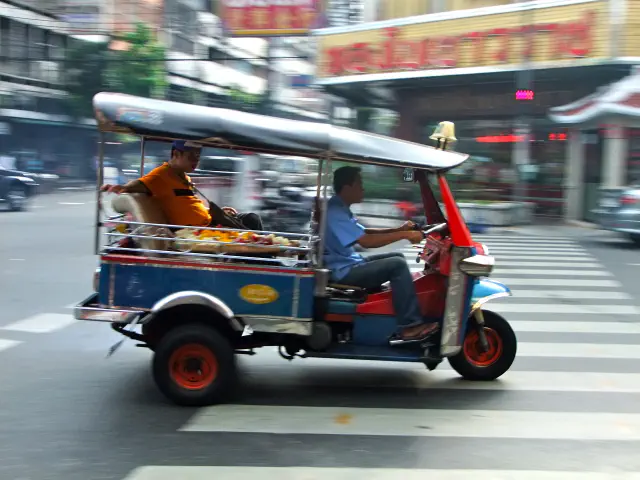One night in Bangkok makes a hard man crumble

I’ve just been shown the studios of Wave 88, an English-language radio station in Bangkok, Thailand. The main on-air studio is small and comfortable; an RCS playout system effortlessly finishes playing one track, plays a jingle, and goes into the next song as I’m shown around. The studio looks outside; and it’s all pretty self-contained; a rack-on-wheels underneath the main desk connects the studio to the transmitters. A whiteboard (de rigeur in every radio studio I’ve been in) has something scrawled in red on it about the headphone jack. A piece of paper shows Wave 88’s SMS shortcode (still six digits, mind you), Wave’s website address, and Wave’s Facebook page. The computer has The Sun’s website on it. It’s all eerily familiar.
Thailand is an odd place to broadcast radio. Licence periods are uncertain, and can last for as little as a year; which would explain why the studio itself is remarkably portable-looking. The FM band is ever so slightly crowded – all large stations are on 88, 88.5, 89, etc, while smaller stations are put inbetween them at the unusual freqencies of 88.25, 88.75, etc. And every single slot is taken. (And we Europeans think the Italians are mad at planning frequencies.)
The transmitters themselves are all run by various parts of the government, and broadcasters pay a monthly fee (around five thousand pounds) to broadcast on them. And, as I sit in the plushly-appointed reception area listening to a little more of Wave 88, I hear the presenter, Paul Jackson, announce that it’s five o’clock and time for the news from Radio Thailand. We hear the pips. Then a rather long pause.
Part of the licence conditions for private radio stations like Wave 88 are that they have to broadcast programming provided by who owns them, in this example, in the form of Radio Thailand. This takes the form of a one hour news programme between 7.00am to 8.00am; news bulletins at the top of the hour including a half-hour lunchtime news programme; and the national anthem at certain times of the day.
The Radio Thailand newsreader, after what seems like an eternity of silence, starts reading the news in heavily accented English. It’s slow and ponderous; a complete contrast to Wave 88’s slick sound only minutes previously. Occasionally we hear an ident for ‘Newsflash!’, which is ostensibly the name of this news broadcast (despite the fact that it isn’t, in any stretch of the imagination, a news flash). The music used for the ident was from one of those Power Shots CDs we all used to use in the late 1980s. Then, the English-speaking listeners to Wave 88 get treated, via Radio Thailand, to a shouty commercial in the Thai language. The newsreader comes back on, does a bit more in a language we can understand, and then, with a sense of relief, we’re back to Wave 88’s mix of Heart-like music, back to Paul’s warm presentation style, and back to 2010.
It must be very difficult to operate a commercial radio station when your breakfast peak is full of that kind of programming, even forgetting this stuff every hour. The only mitigation I can see is if your listener tries switching to another station, they’ll find Radio Thailand there, too, so they’ll soon learn to stop switching. It does, however, worry me that radio in this country is being forced to sound bad: Radio Thailand has no particular requirement to safeguard the medium for the future, and adding these massive switch-off points during the day can only help the sales of iPods (or the Asian knock-offs which are rather more freely available in any street market here). This requirement doesn’t happen on the television, either; none of the channels I’ve seen have to break off for some poorly-produced programming every hour or so. Censorship of TV channels is one thing; but radio fares much worse here – and is disadvantaged in a way it’s difficult to comprehend.
Later, at 5.30pm in the car, I hear another news bulletin on Wave 88. This time, it’s from the BBC: it’s short, snappy, and fronted by one of the BBC World Service’s rather splendid new jingles, dual-crediting the BBC and Wave 88. The BBC World Service is wholly funded by the UK government, and they can still make a news bulletin which doesn’t sound too out of place, surprisingly, on a pop station like Wave 88. Perhaps Radio Thailand needs a little of the BBC’s know-how: for the sake of the future of the medium here.
I’m grateful to Richard Buckle for his time and for getting me into the studio, and for Paul Jackson’s time in showing us round. Nobody I met commented on Radio Thailand’s output during my visit; the above is just my view after listening.